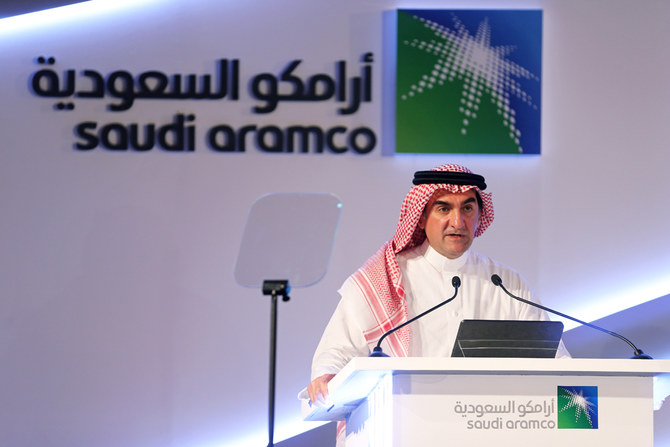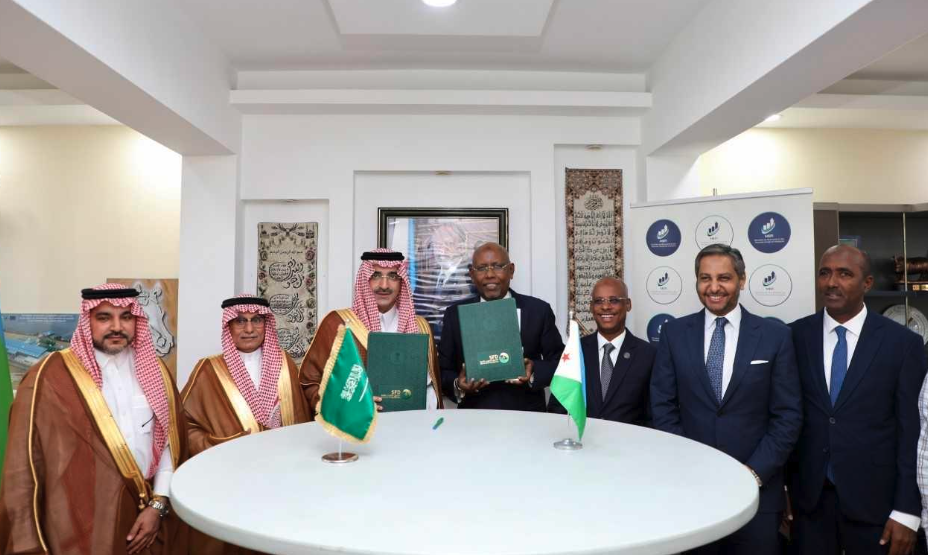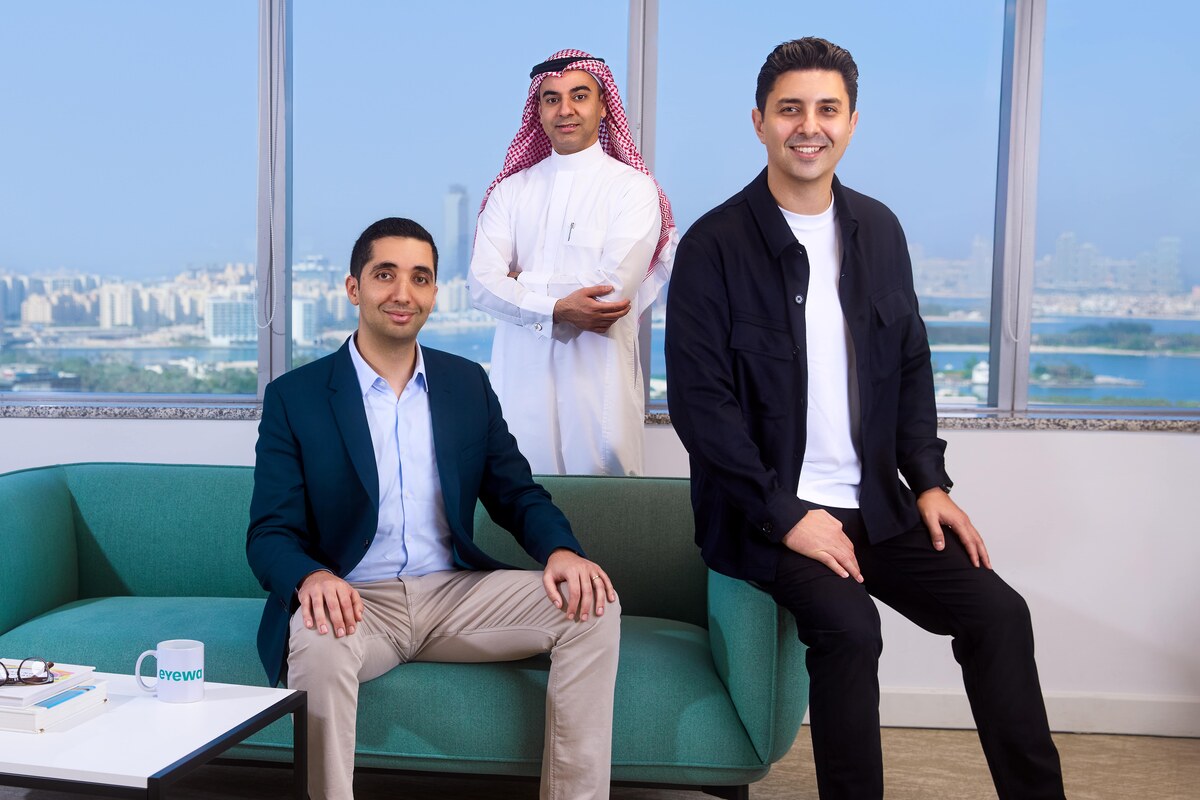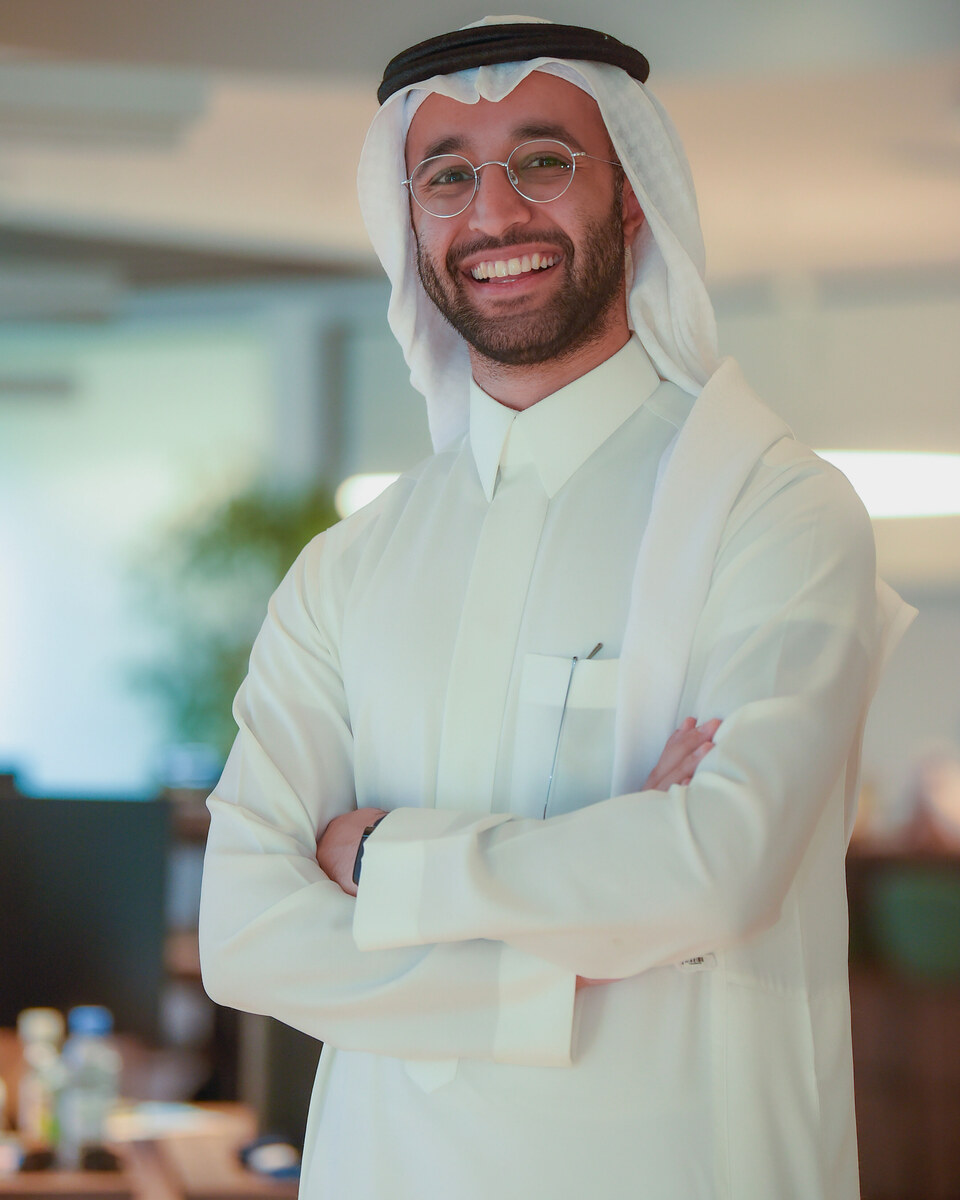DUBAI/DHAHRAN: Saudi Aramco's multibillion-dollar share sale, likely the biggest initial public offering (IPO) in history, is officially underway after the company formally announced its plans to list stock on the Kingdom’s stock exchange, the Saudi Tadawul.
By the middle of December, Saudi citizens, expatriates and international investing institutions will be able to buy quoted shares in the world’s biggest oil company, fulfilling a pledge made by Crown Prince Mohammed bin Salman in 2016.
Aramco Chairman Yasir Al-Rumayyan made the announcement in Dhahran, saying: “Today marks a significant milestone in the history of the company, and important progress toward delivering Saudi Vision 2030, the Kingdom’s blueprint for sustained economic diversification and growth.”
News of the long-awaited IPO came in the form of a notice from the Capital Markets Authority (CMA), the market regulator, that the proposed share issue has been approved.
The Capital Market Authority Announces the Approval on the Initial Public Offering of the Saudi Arabian Oil Company’s Shares.https://t.co/ACMiPBuo86
— Capital Market Authority (@SaudiCMA_En) November 3, 2019
“Saudi Aramco has received the confirmation from Saudi Tadawul to list ... it will start the official IPO (process),” Al-Rumayyan, who is also the governor of the Saudi Public Investment Fund, said during a press conference in Dhahran.
“The biggest shareholder will be Saudi … One thing has not changed about the company, its constant desire for growth and expansion,” Rumayyan said. “Today, because of the IPO, new people can reap the benefits of Saudi Aramco.”
Rumayyan also said that: “Aramco’s listing in Tadawul shows that our country has become more attractive to international investors.” He added that there are no current plans for a foreign share listing and the shares offering would be limited to the Tadawul for now.
Rumayyan, responding to reporters’ questions, also said that the percentage of foreign/local investors was yet to be determined. “The percentage of local and international investors will be set later … after we are done with the public offering,” he said.
The offering price was also still to be determined, Rumayyan added.
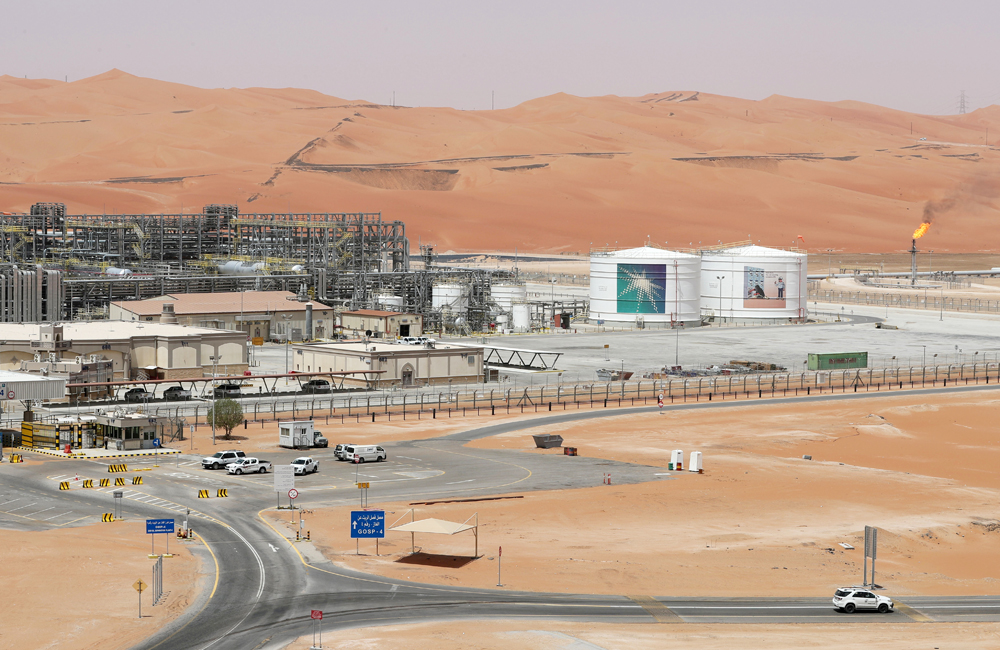
View of the production facility at Saudi Aramco's Shaybah oilfield in the Empty Quarter, Saudi Arabia. (REUTERS/Ahmed Jadallah/File Photo)
Financial performance
Aramco also gave details of its financial performance in the period that included the attacks on its facilities at Abqaiq and Khurais, which knocked out a big chunk of oil production for a short time.
Aramco still made $68 billion in the last nine months of the year, and suffered no material financial effect from the attacks.
No exact details of the timing or valuation of the IPO were given. There will be more information published in a detailed prospectus expected early next week.
The final value of the IPO will depend on how much demand there is from Saudi, regional and international investors, a process known as “book building” in the financial industry.
“The percentage of international investors versus local investors is yet to be determined,” said Aramco CEO and President Amin Nasser.
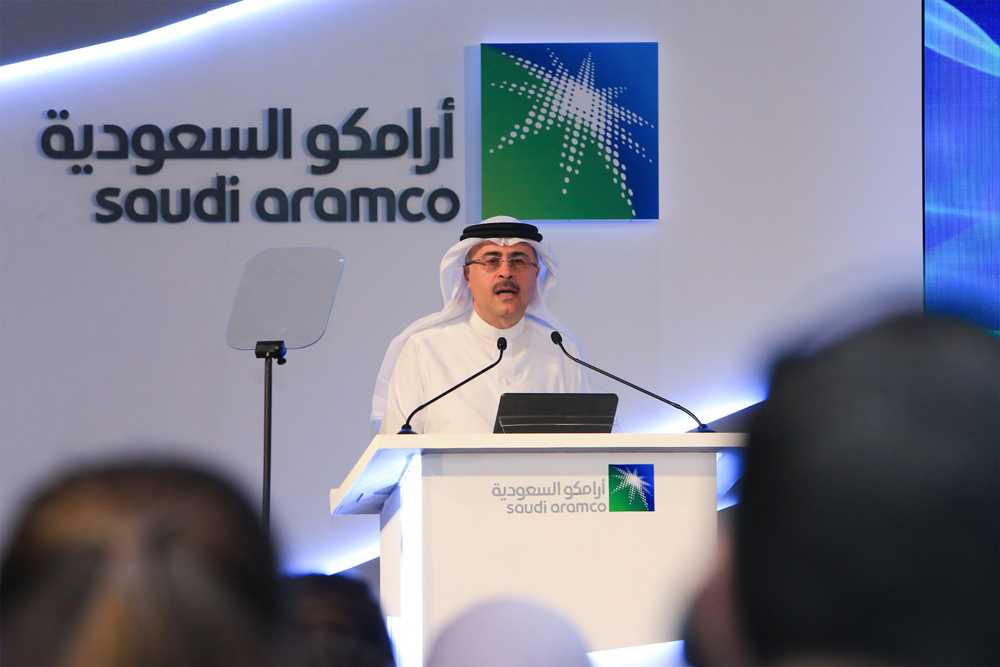
Amin Nasser, President and CEO of Saudi Aramco, speaks during a press conference in Dhahran on Nov. 3, 2019. (AFP)
Today the company … makes a new step to offer chances for Saudi nationals and others to own shares in Aramco,” Nasser said.
He also described the company’s research activities, which was “focused on advancing the technologies we use for filtration and creating more green technologies for oil filtration.”
Foreign exchange
Al-Rumayyan said there are no current plans to list the shares on a foreign exchange. Many international bourses have been vying for the privilege of staging the world’s biggest and most profitable company, but Al-Rumayyan said: “For the international listing part, we’ll let you know in due course. So far, it’s only on Tadawul.”
Tadawul CEO Khalid Al-Hussan said the exchange is “ready to receive the largest listing in the history of financial markets.”
Cornelia Meyer, business consultant, macro-economist and energy expert, told Arab News: “Good idea to start with a Tadawul IPO. It is important that Saudis can first and foremost participate in the sale of the country's crown jewel.“As a comparison (peer group valuations IOCs like Exxon achieve multiples of around 11), Aramco will be higher. This has to be seen in the context that Aramco is the world's most profitable company by net income, which is bigger than the one of Alphabet Amazon and Microsoft combined," she said.
“While international investors will look at geopolitical risk after the attacks on Abqaiq and Khurais, this is mitigated by the fact that the company restored full production in under a month and capacity will be restored by the end of November.
She said: “The valuation will be of prime interest internationally. All in all Aramco is an extraordinarily well-run company.”
ALSO READ: Saudi Aramco IPO termed a 'unique investment proposition'
Who can take part?
All Saudi citizens and non-Saudi naturals who are resident in the Kingdom will able to take part in the share sale, as will other citizens of Gulf Cooperation Council member states.
There are incentives in the terms of the offer to encourage citizens to hold the shares for at least six months after trading begins, when they will receive a free bonus allocation of shares.
Nasser said: “Our mission is to provide our shareholders with long-term value creation through crude oil price cycles by maintaining our pre-eminence in oil and gas production, capturing additional value across the hydrocarbon value chain and profitably growing our portfolio.”
The share sale is expected to produce a rush of interest in the Kingdom, with some banks reported to be offering special loans for investors to take up their entitlement in the IPO.
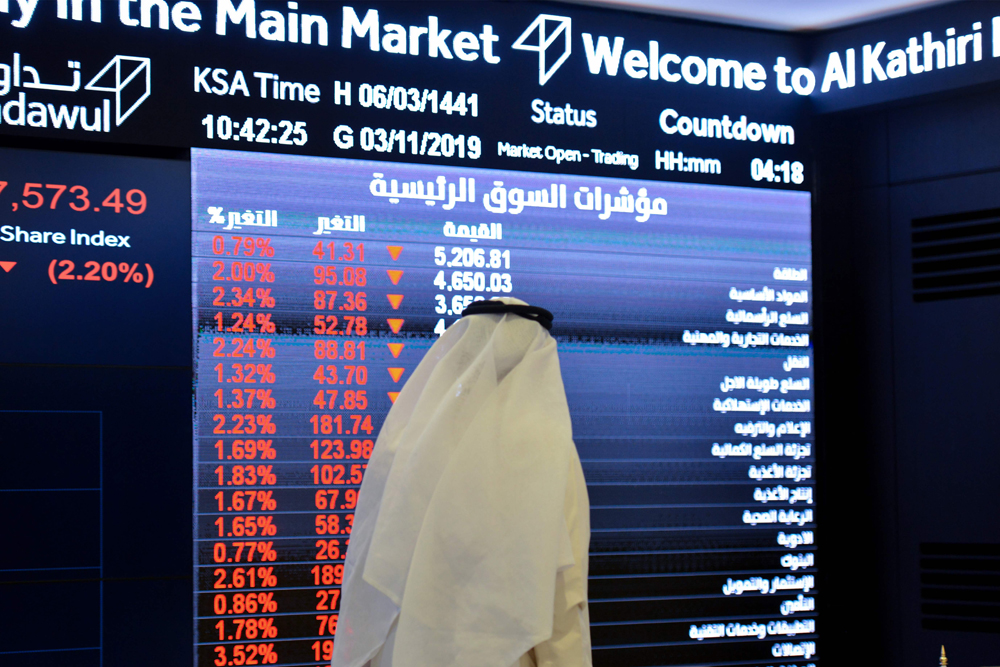
A Saudi man monitors stock prices at Tadawul Saudi bourse in Riyadh on November 3, 2019. (AFP / FAYEZ NURELDINE)
Cash dividends
Nasser also mentioned the company’s intention to declare cash dividends of at least $75 billion.
An Aramco document stated: “Subject to the Board’s discretion after consideration of a number of factors, the Board intends to declare aggregate ordinary cash dividends of at least $75 billion with respect to calendar year 2020, in addition to any potential special dividends,” Aramco said.
“In addition, to the extent that the Board determines that the amount of any quarterly cash dividend declared with respect to calendar years 2020G through 2024G would have been less than $0.09375 per Share (based on 200,000,000,000 Shares outstanding) but for the Government forgoing its rights to such dividend as follows, the Government will forgo its right to receive the portion of cash dividends on its Shares equal to the amount necessary to enable the Company to first pay the minimum quarterly cash dividend amount described above to holders of Shares other than the Government,” the document said.
“The remaining amount available for distribution with respect to such quarter as determined by the Board in its discretion will then be distributed to the Government.”
Opinion
This section contains relevant reference points, placed in (Opinion field)
Aramco’s share price, number of shares to sold and the percentage of shares to be sold will be determined at the end of the book-building period, the oil giant said. The share offering will be open to individual and institutional investors but “subject to restrictions on the sale, disposition or issuance of additional shares, the details of which will be provided in the prospectus.”
The share offering would be in two tranches: one for institutional subscribers eligible to participate in the book-building process and another for individual investors comprise of Saudi Arabian nationals, non-Saudi individuals who are residents in the Kingdom and any GCC national.
“An eligible retail bonus investor who has been allotted shares and continuously and uninterruptedly holds the allotted shares for 180 days from (and including) the first date of trading and listing on the exchange will be eligible to receive one share for every 10 allotted shares so held, up to a maximum 100 bonus shares,” Aramco said.
“An eligible bonus investor would be entitled to receive up to a maximum of 100 bonus shares only.”
The Aramco document pegged the company’s revenue as of the third quarter to $244 billion; net income at $68 billion and a free cash flow of $59 billion. Its capex was listed at $23 billion as of the nine-month period.
Capital Market Authority's statement
Saudi Arabia’s Capital Market Authority (CMA) earlier on Sunday issued a statement saying Saudi Aramco’s application for the registration and offering of part of its shares has been approved.
Aramco’s prospectus will be published prior to the start of the subscription period, a statement from the CMA said.
The prospectus includes all relevant information that the investor needs to know before making an investment decision, including the company’s financial statements, activities and management.
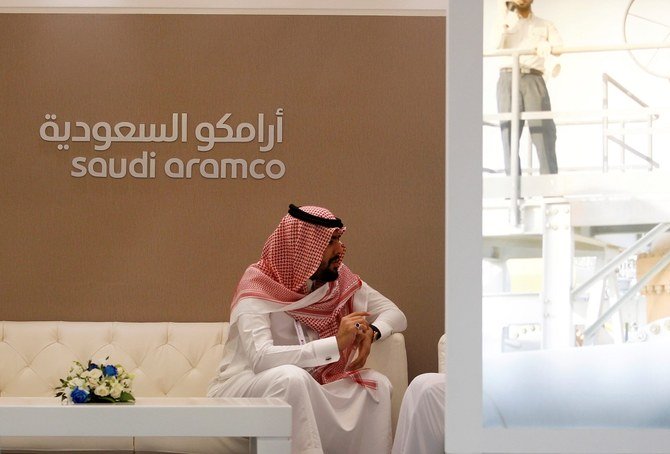
Aramco’s prospectus will be published prior to the start of the subscription period, the CMA said. (Reuters)
The CMA’s approval on the application is valid for 6 months from the CMA Board resolution date, and would be deemed cancelled if the offering and listing of the Aramco’s shares are not completed within this period.
The CMA in its statement said, “a subscription decision without reading the prospectus carefully or fully reviewing its content may involve high risk. Therefore, investors should carefully read the prospectus, which includes detailed information on the company, the offering and risk factors.
“Thus, providing potential investors the ability to evaluate the viability of investing in the offering, taking into consideration the associated risks. If the prospectus proves difficult to understand, it is recommended to consult with an authorized financial advisor prior to making any investment decision.”
The regulatory agency added that approval on the application should “never be considered as a recommendation to subscribe in the offering of any specific company.”
“The CMA’s approval on the application merely means that the legal requirements as per the Capital Market Law and its Implementing Regulations have been met,” it said.




